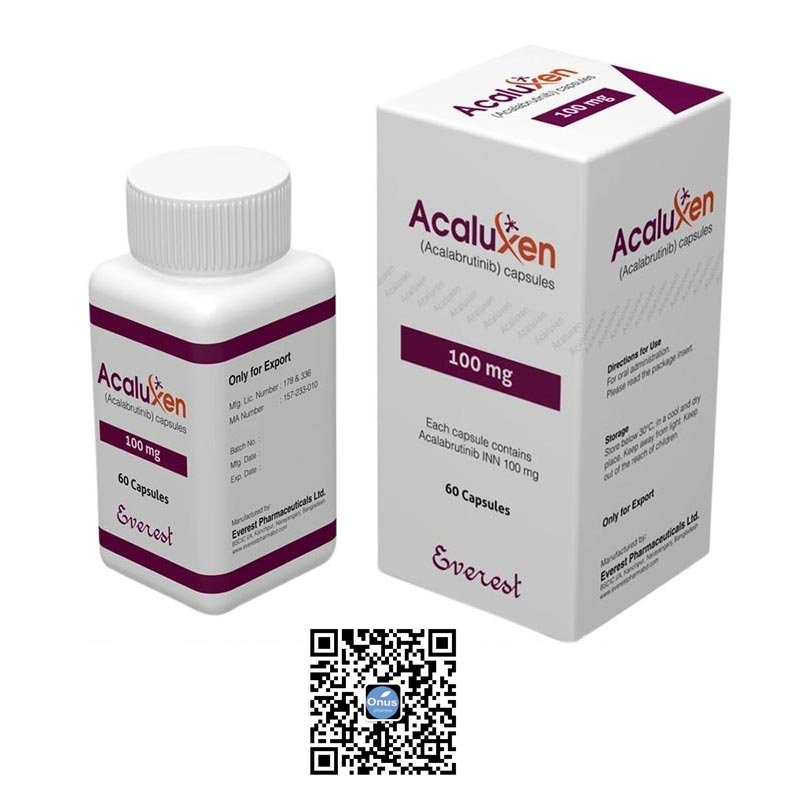Address
Road no. 4, Vatara, Notun Bazar
Dhaka, Bangladesh
Address
Road no. 4, Vatara, Notun Bazar
Dhaka, Bangladesh

Generic Name: Acalabrutinib
Brand Name: Acaluxen
Strength: 100 mg
Dosage Form: Hard Gelatin Capsule
Manufacturer: Everest Pharmaceuticals Ltd.
Therapeutic Class: Antineoplastic Agents (Tyrosine Kinase Inhibitor)
Acaluxen 100 mg contains Acalabrutinib, a highly selective, second-generation small-molecule inhibitor of Bruton tyrosine kinase (BTK). It is the generic equivalent of the innovator brand Calquence.
Acalabrutinib is designed to improve upon first-generation BTK inhibitors by exhibiting greater selectivity for the BTK enzyme. This selectivity minimizes off-target activity against other kinases (such as EGFR, TEC, and ITK), which is clinically associated with a reduced incidence of adverse events like atrial fibrillation and severe bleeding.
Acalabrutinib acts by forming a covalent bond with a cysteine residue in the BTK active site, leading to the inhibition of BTK enzymatic activity. BTK is a signaling molecule of the B-cell antigen receptor (BCR) and cytokine receptor pathways.
In B cells, BTK signaling results in activation of pathways necessary for B-cell proliferation, trafficking, chemotaxis, and adhesion. By inhibiting this protein, Acaluxen 100 mg effectively blocks the survival signals of malignant B cells, halting tumor growth in conditions like Chronic Lymphocytic Leukemia (CLL) and Mantle Cell Lymphoma (MCL).
Acaluxen is indicated for the treatment of adult patients with specific hematological malignancies:
Indicated for adult patients with MCL who have received at least one prior therapy. Clinical studies have demonstrated high overall response rates (ORR) in relapsed/refractory cases.
Indicated for the treatment of adult patients with CLL or SLL. It is approved for use as:
First-line therapy: For previously untreated patients.
Relapsed/Refractory therapy: For patients who have not responded to or have relapsed after previous treatments.
Note: Therapy should be initiated and supervised by a physician experienced in the use of anticancer medicinal products.
Recommended Dosage: The recommended dose is 100 mg taken orally approximately every 12 hours.
Administration: Swallow the capsule whole with water. Do not open, break, crush, chew, or dissolve the capsule.
Relation to Food: Acaluxen can be taken with or without food.
Missed Dose Protocol: If a dose is missed by more than 3 hours, it should be skipped. The next dose should be taken at the regularly scheduled time. Extra capsules should not be taken to compensate for a missed dose.
Dose interruptions or modifications may be required for Grade 3 or higher adverse reactions, or persistent Grade 2 toxicities. Consult the full prescribing information for specific toxicity management guidelines.
Acalabrutinib solubility decreases with increasing pH. Concomitant use with gastric acid-reducing agents can significantly lower the drug’s efficacy.
Proton Pump Inhibitors (PPIs): Avoid co-administration with PPIs (e.g., Omeprazole, Esomeprazole).
H2-Receptor Antagonists: Take Acaluxen 2 hours before taking an H2-receptor antagonist (e.g., Famotidine).
Antacids: Separate dosing by at least 2 hours.
CYP3A Inhibitors/Inducers: Strong CYP3A inhibitors (like Ketoconazole) usually require dose reduction, while strong inducers (like Rifampin) should be avoided.
While Acalabrutinib generally demonstrates a favorable safety profile compared to Ibrutinib, patients should be monitored for the following:
Common Adverse Reactions (>20%):
Headache
Diarrhea
Musculoskeletal pain
Upper respiratory tract infection
Fatigue and bruising
Warnings and Precautions:
Hemorrhage: Serious hemorrhagic events have occurred. Patients on concomitant antiplatelet or anticoagulant therapy should be monitored closely.
Infections: Serious infections (bacterial, viral, or fungal) can occur. Prophylaxis against opportunistic infections may be considered.
Cytopenias: Grade 3 or 4 neutropenia, thrombocytopenia, and anemia may develop. Complete blood counts should be monitored monthly.
Cardiac Arrhythmias: Atrial fibrillation and flutter have been reported. Monitor for symptoms like palpitations or dizziness.
Store below 30°C (86°F).
Keep in original packaging to protect from moisture.
Keep out of reach of children.
Everest Pharmaceuticals Ltd. is a renowned pharmaceutical manufacturer in Bangladesh, specializing in high-value oncology and chronic care medicines. Their facility adheres to strict GMP (Good Manufacturing Practice) standards to ensure that generic formulations like Acaluxen meet global quality benchmarks for bioequivalence and purity.
No, Acaluxen is a Targeted Therapy. Unlike traditional chemotherapy, which affects all rapidly dividing cells, targeted therapies specifically attack cancer cells by interfering with specific molecules (like the BTK protein) involved in tumor growth.
Acaluxen is a generic formulation. Generic medicines typically cost significantly less than brand-name drugs because the manufacturer does not bear the initial research and development costs. However, they contain the same active ingredient and therapeutic effect.
Onus Pharma supplies Acaluxen 100 mg directly from the manufacturer to ensure cold-chain compliance and authenticity.
Acaluxen contains Acalabrutinib, the same active ingredient found in Calquence. It is a generic version manufactured in Bangladesh, offering the same therapeutic mechanism at a lower cost.
It is generally recommended to avoid or limit alcohol, as it may interact with the liver’s ability to process the medication.
Prices fluctuate based on the manufacturer’s supply. For the most accurate Acaluxen 100 mg price, please click the WhatsApp button or “Request a Quote” on our page.
Reviews
There are no reviews yet.